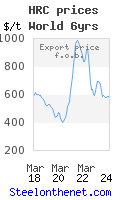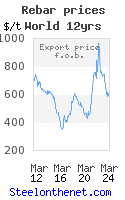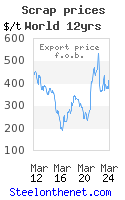Steel Industry Consolidation Continues Apace
MEPS today publish a viewpoint on steel industry consolidation.
The Tata / Corus merger, say MEPS, will do little to advance the overall consolidation of the main suppliers. Based on 2005 output, the ten largest steel companies make a total of 316 million tonnes - equivalent to 28 percent of the world total production. Merging Tata with Corus will raise the top ten's share by just 0.4 of a percentage point.
According to MEPS, Tata does however have plans for massive expansion. As well as doubling capacity at its Jamshedpur works to 10 million tonnes per year, Tata is apparently working on no fewer than three greenfield integrated steelworks projects in India, as well as large-scale projects in Iran and Bangladesh.
Moreover say MEPS, the Tata-Corus acquisition will keep consolidation uppermost in the strategic thinking of steel company executives all around the world. If the formation of Arcelor Mittal made it urgent for other mills to consider expanding by acquisition, Corus-Tata has reduced the number of targets available. There is probably room for only a few more acceptable combinations of mid-size steelmakers in Western Europe and North America. It is Asia that has the most potential say MEPS.
Ten of the world's top 20 steel companies are based in Asia. Of these, Nippon Steel and Posco show little interest in either acquiring or being acquired. In fact the two organisations took steps to strengthen their mutual alliance - in order to fend off hostile takeover bids.
Of the others, Sumitomo Metals has close links with Nippon Steel, and Japan's JFE recently formed an alliance with Dongkuk of Korea. They are unlikely to be players in any global consolidation unless competitive pressures intensify.
China has five steel companies in the world's top 20 but the industry is hugely fragmented and consolidation is now moving rapidly up the agenda. China's leading steelmaker, Shanghai Baosteel, has attempted to establish co-operation pacts with some other Chinese mills, and these may eventually result in business combinations. The merger of Anshan and Benxi Steel could be a model for others.
For full report, visit http://www.meps.co.uk/viewpoint10-06.htm.
blogger@steelonthenet.com
The Tata / Corus merger, say MEPS, will do little to advance the overall consolidation of the main suppliers. Based on 2005 output, the ten largest steel companies make a total of 316 million tonnes - equivalent to 28 percent of the world total production. Merging Tata with Corus will raise the top ten's share by just 0.4 of a percentage point.
According to MEPS, Tata does however have plans for massive expansion. As well as doubling capacity at its Jamshedpur works to 10 million tonnes per year, Tata is apparently working on no fewer than three greenfield integrated steelworks projects in India, as well as large-scale projects in Iran and Bangladesh.
Moreover say MEPS, the Tata-Corus acquisition will keep consolidation uppermost in the strategic thinking of steel company executives all around the world. If the formation of Arcelor Mittal made it urgent for other mills to consider expanding by acquisition, Corus-Tata has reduced the number of targets available. There is probably room for only a few more acceptable combinations of mid-size steelmakers in Western Europe and North America. It is Asia that has the most potential say MEPS.
Ten of the world's top 20 steel companies are based in Asia. Of these, Nippon Steel and Posco show little interest in either acquiring or being acquired. In fact the two organisations took steps to strengthen their mutual alliance - in order to fend off hostile takeover bids.
Of the others, Sumitomo Metals has close links with Nippon Steel, and Japan's JFE recently formed an alliance with Dongkuk of Korea. They are unlikely to be players in any global consolidation unless competitive pressures intensify.
China has five steel companies in the world's top 20 but the industry is hugely fragmented and consolidation is now moving rapidly up the agenda. China's leading steelmaker, Shanghai Baosteel, has attempted to establish co-operation pacts with some other Chinese mills, and these may eventually result in business combinations. The merger of Anshan and Benxi Steel could be a model for others.
For full report, visit http://www.meps.co.uk/viewpoint10-06.htm.
blogger@steelonthenet.com




0 Comments:
Post a Comment
<< Home